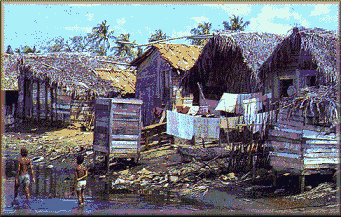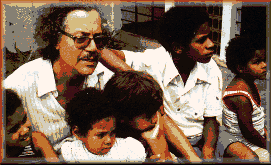 |
 |
 |
|
|
~PEOPLE AND EVENTS IN THE POVERTY
OF BRAZIL. The degree on inequality in Brazil is great. The poor labour under a belief
that they are of little value, and have a profound ignorance of the concept of human
rights.

Meagre housing in Recife, Brazil.
The work of the Oblates in Brazil is about raising hope. It
is about building strong supportive communities from scraps of humanity, about people
standing together, standing up for themselves.
Lives touched by the Oblates...
|
|
| "when
,we have good health, we have a lot to be thankful for." |
|
Maria de Fatima was sitting with her two children. One of the children
had been a bit disfigured due to a fire some years previously, but nonetheless they both
seemed happy children, and attached to their mother. "How are you Maria?", I
asked. "Fine", she said with a pleasant smile, "when ,we have good health,
we have a lot to be thankful for." With such a pleasant opening, little did I imagine
how much this lady was suffering at this moment. A few weeks previously her husband, who
had a drinking, problem, sold their house and disappeared with all the money and most of
the belongings, leaving them to live on the street. After a week of sleeping in the open,
a good man offered her the bottom part of his lot (garden). She was so grateful for this,
and now all she needed were some bits of wood and some plastic to have a roof over her
head.
This would leave her happy, as she would have a place she could call her own. |
|
| |
|
Threatening
the Foundations. |
|
|
Sueli
and Antonia have three boys and a severely handicapped girl he manages to work from time
to time but is often unemployed. The amount he earns is not enough for a proper diet, not
to speak of health, education, or construction of their house. They have just two rooms,
but one of these is so damp in the rainy season that they all move into the other room
which serves as living-room dining-room, bed-room. At the end of the last dry season, the
well went dry, and the bottom of it began to cave in, threatening the foundations of the
house which was all too close. The misery was so great that the eldest boy of ten began to
find that life on the street was more interesting and rewarding. He began to stay out in
his own neighbourhood, but it was not long until the lure of the city centre drew him
inevitably more and more into the life of the street kids of Goiania. The parents had lost
control, and had nothing better to offer. Eventually, one of his grandparents offered him
a home in another part of the city. Daniel was one of the lucky ones many of his
companions are already addicted to drugs and suffering bad health, on a road to self
destruction. |
| |
| Robbed of his weekly wage, and knifed in the chest. |
|
| Doralice
is twenty six years old, and her husband Francisco is one year older. They have eight
children, and all live in one room. The mattresses that they spread out at night are stood
upright against the wall during the day, and the one bed in the middle of the room acts as
the only seat in the house. Being a labourer, he received very little money, but at least
it provided rice and beans for the 'table' every day (the table being the dirt floor), and
they were reasonably happy. One night, returning. from work at seven o'clock, he was
attacked by a gang, robbed of his weekly wage, and knifed in the chest. No longer able to
work because of the wound, he had to stay at home, and Doralice found some part-time work
in the city washing clothes. Now they have enough to buy rice, and have to look for help
for the beans. If they could afford to buy medicine he could probably recuperate faster,
but the doctor's prescription cost a whole week of Doralice's salary. There is nothing
they can do but wait and hope. |
|
| |
|
Widow,
twenty eight years of age. |
|
|
Marlene is a widow, twenty eight years of age, and with two children
and a very sick father. She is in the community co-ordination, runs a catechism programme
in her house, organises reflection groups in her neighbourhood, and helps in the liturgy
group. She works sufficiently to keep the family supplied, at least with the minimum. Her
neighbours children were practically living on the street, so she also had them in her
house most days. She became Godmother to children when the mother finally decided to
baptise them. This family decided to move to Belen, over two days journey by bus. For over
a year, Marlene heard nothing from them or about them, until one day the two children
appeared on her doorstep. Things had got worse for them in Belen, so the children, of 9
and 11 years, were sent to their Godmother in Goiania. Thus, without any preparation,
Marlene has Inherited two street kids. |
| |
|
|
|
|
These people have lost their
possessions, their homes, their income, hope and the protection of the law.
Significantly, most have also lost their religion. 
Fr Roger Bergkamp celebrates the first anniversary of the
struggle for land ownership in Arariba de Baixo-Cabo.
Because the need is so great the parishes are vast.
There is a group of seven Oblates working in the outskirts of the city of Goiania,
covering two parishes, with a combined population of over 150,000 people.
Unemployment is high. Those lucky enough to have jobs
often have to leave for work at 5:00 am, and may not return until 7:00pm. They have to
take at least two buses each way to get to work. Mothers frequently sleep overnight in a
queue to try and secure a place for their children at school.

On a farm near Recife, Fr. Ed. Figueroa has been working since
1981 at the 'God and Our Lady Community' that cares for abandoned children, from a few
months to 17 years old.
Young people work during the day to support themselves in
school, they finish classes at 10:30 at night, and next morning they are back in the bus
before dawn heading for work, -they have no time to study, and even with the job, can only
afford, to buy a fraction of the books required. The majority of the people are a long way
from medical care, and even if they do manage to get to a hospital, they often cannot
afford the prescription. The medicines are at first-world prices for people with
third-world salaries.
|
|
Irish
Oblate Honoured in Brazil. |
|
|
For his active solidarity with the poor and marginalised population in
Rio. Fr. John Cribbin received the Pedro Ernesto Medal, the highest civic honour
awarded by the Municipal Chamber of the city of Rio de Janeiro. Born in Limerick, Fr. Cribbin studied to become a priest and was
ordained in 1961. He was one of the founding members of the Anglo-Irish oblate
mission in Brazil. In 1962 he started in the parish of Sao Simao, in the state of
Goias. There he became acquainted with the hardship of the poor in Brazil. He
was to face the same social realities when he moved to Rio in 1966, where he has remained
since.
Elzinha Peres, a lady from the shanty town, Santo Expedito.
"I have not the gift of speechmaking... For about 22 years we knew
our dear pastor, Fr John... The consciousness I have today of my human rights I owe to
him. Twenty years ago I could never have imagined I could come to a place like this
and address you about anything, much less talk about my human rights... I am not
making distinctions but there ought to be a Brazilian like him. He is a priest of a
different race but he has the Brazilian spirit and the Brazilian soul. I
congratulate him on his award."

|
| |
|
|
|
|

|
|